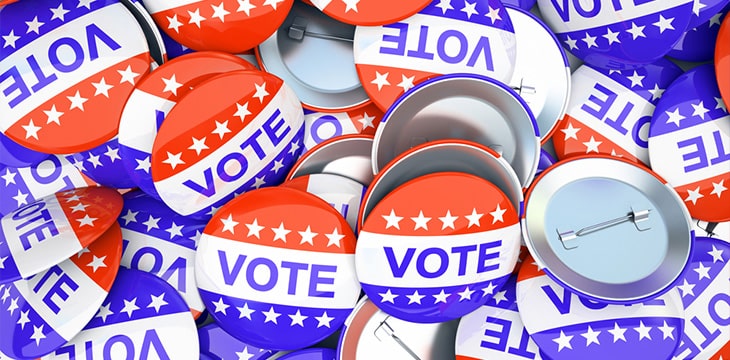|
Getting your Trinity Audio player ready...
|
The results are in, almost, and the predicted ‘red wave’ turned out to be more of a splash, with Democrats holding the U.S. Senate and only marginally losing the House in the United States midterms.
Bucking expectations of a vast demographic recoloring on the Hill, the surprise showing from the Democrats wasn’t the only significant event of November. While votes were being counted across the country, the largest digital asset industry donor was spiraling into crisis.
This has left many asking what it all means for politics in the U.S. over the next two years, as well as for key battleground issues—digital assets being one.
The midterms came along at a time of turmoil for a digital asset industry that has spent millions of dollars on U.S. midterm election races during its year of heavy losses and intermittent crisis. BTC’s price has plummeted about 70% from its peak, and November 11 saw the culmination of FTX‘s liquidity crisis, as the company filed for bankruptcy and its CEO Sam Bankman-Fried resigned.
“I think the government has a lot to deal with immediately,” said Bryan Daugherty, co-founder of SmartLedger and global public policy director for Bitcoin Association, speaking with CoinGeek. “Figuring out the Sam Bankman-Fried situation and everything that’s tied to that, as well as the contagion that may continue to occur. That’s where the primary focus is going to be, and I really hope they’re able to delineate between cryptocurrency and blockchain banking services.”
Ironically, Bankman-Fried far outspent all other digital asset industry lobbyists, with nearly $40 million in contributions to campaigns this election cycle making him the sixth-largest individual donor in the U.S., according to OpenSecrets’ biggest individual donor list.
Congress is also in the process of debating several pieces of legislation designed to tighten the regulation around digital assets and empower the sector’s enforcement agencies. Bills such as the Digital Commodities Consumer Protection Act (DCCPA) have the benefit of bipartisan support, which in theory, should shield them from one of the major governing bodies switching hands.
“Whether I’m talking with Democrats or Republicans, I think what we’ll see from Congress and the Senate this year is a push for regulators to get more involved with cryptocurrencies, exchanges, and custodial wallets. I think we’ll start to see the SEC (Securities and Exchange Commission) and others really kind of move up their timeline,” said Daugherty.
While some cross-party consensus on more ‘involved’ regulators looks set to continue, the composition of the next House will be slightly younger and more Republican, two trends that, in theory, favor a more ‘crypto-friendly’ environment on Capitol Hill. A demographic shift that has the potential to cause friction, further delaying bipartisan efforts to regulate digital assets at a time when the industry desperately needs clarity.
However, speaking to CoinDesk prior to the elections, Howard Greenberg of Prosper Trading Academy said, “a win by the Republican Party would be considered positive for crypto.” He went on to suggest that a Republican House might actually encourage greater inter-party cooperation and get the stalling legislation passed through.
Considering the ever-increasing polarization of U.S. politics, this might seem a slightly idealized ‘West Wing-esque’ view of cooperation on the Hill, but bills such as the DCCPA had cross-party support before the midterms, so there’s no reason that can’t continue under a Republican Congress.
Pre-elections and lobbying
Before the midterms, the Democrats held a narrow majority in the House, and Vice President Kamala Harris’ deciding vote broke a 50-50 split in the Senate.
This was a situation that, in the short term, allowed for legislation to be tabled and have a shot at going through. Although, despite bipartisan support and a Democrat-controlled Congress, the progress of bills hasn’t been swift. As Daugherty observed:
“What I’ve noticed since October or September is a huge slowing down by a lot of policymakers. They’re saying,’ we need to take a step back and understand this technology a little bit more, and then start making some of these decisions, ‘and I think we saw that with a lot of the things that were pushed forward.”
This could be a sign of a more considered approach and desire to understand the technology before regulating it, however, it could equally be classic legislative feet-dragging in the lead-up to an election, with lawmakers waiting to see what the make-up of the next House and Senate will be.
In terms of this make-up, lobbying, as always, has something to say on the topic, and like most sectors, the digital asset industry had its contributors.
“A lot of policymakers that I spend time with were definitely getting inundated with all sorts of different groups and blockchains and digital assets political advocacy,” suggested Daugherty.
Chief amongst the industry advocates was the now notorious Sam Bankman-Fried, who spread the financial love liberally. A fact that, in the light of the FTX collapse, has the potential for adverse effects on the industry he represented.
“SBF has been a major donor of not just Biden, but Democrats across the U.S., and I think there may be a witch hunt,” warned Daugherty. “Today, a lot of politics is making sure to point out the other party’s failures. So, I hope that through any process the government provides in this realm, they really don’t throw out the baby with the bathwater, have some knee-jerk reaction, and taking incredible action against illicit actors or cryptocurrencies that actually ends up harming the economic future of the United States, by not having these types of resources available.”
We won’t know whether these fears will be realized in the short term, so let’s take a look at what has happened and what it means.
The good, the bad, and the Senate
Possibly the biggest surprise of the midterms was the Democrats retaining the Senate, bucking predictions of a red sweep of Capitol Hill.
The Senate was split 50-50 before the midterms, with the Democrats in control thanks to the casting vote of Vice-President Kamala Harris. The current numbers are 50-49 in favor of the blues, and the December 6 run-off in Georgia could see them gaining a seat on the previous two years.
Had the Senate swung Republican as expected, Senator Sherrod Brown of Ohio, an outspoken ‘crypto-skeptic,’ would have lost the chairmanship of the Banking Committee, most likely to be replaced by Tim Scott of South Carolina. Scott is an unknown quantity in the digital asset debate but would have almost certainly been considered a more favorable choice. As things played out, the Banking Committee remains under its current stewardship, for better or worse.
Counterfactuals aside, Tuesday did herald the arrival of some new ‘young’ pro-crypto Republicans to the Senate. James David Vance, who recently disclosed that he owns $100,000 to $250,000 worth of bitcoin, won the open seat in Ohio, while Katie Britt won the Alabama Senate race and has also voiced her “staunch support for the digital asset ecosystem.”
In another victory for the Republicans, Ted Budd won his Senate bid in North Carolina and will likely renew his efforts to curtail a bill extending the Treasury’s powers in the digital asset space.
The House still stands, or stands still
In one of the more expected results of the midterms, the Republicans managed to win back control of the House of Representatives, if less emphatically than forecasted.
This swing to the right puts Patrick McHenry of Virginia in line to take up the chairmanship of the Financial Service Committee. This will likely raise the hackles of Wall Street and the cheers of digital asset players who remember comments such as, “Congress must work to fully understand and embrace these innovative new technologies, like crypto.”
McHenry is also known to be a critic of the SEC’s heavy-handed approach to the industry, stating, “the regulation by enforcement at Gary Gensler’s SEC is stifling American innovation.”
However, this does not necessarily mean a roll-back on upcoming legislation, as McHenry is also a known advocate of greater cooperation between the SEC and Commodity Futures Trading Commission (CFTC), as well as efforts to bring the “ugly baby” of ‘stablecoin‘ further into the regulatory fold.
The post-FTX and midterms landscape
All the talk at the moment, rightly or wrongly, is about the consequences of the FTX crisis for the industry as a whole. As the overall surprise of the midterms was, in fact, the underwhelming change it represented, it could be safe to assume that the collapse of FTX will have more of an impact going forward than a light shake-up on the Hill.
“The Democrats are still in control as far as the Senate, in the House, the Republicans are in control, and we’re on the backside of the Biden presidency,” said Daugherty.
“Typically, in the United States, the second two years of the presidency is kind of very slow and lethargic. I don’t know if we’ll see a lot happen.”
So as the momentum for stronger regulation builds up, flowing from the FTX crisis, it seems it may be halted by the slow turning wheels of a hesitant Congress and the typical intransigence that comes with the back-end of a Presidency.
Perhaps then, predictions are futile when an unstoppable force meets an immovable Congress.
Watch: The BSV Global Blockchain Convention presentation, Domineum: Better Government & Enterprise Applications with BSV

 02-23-2026
02-23-2026 




